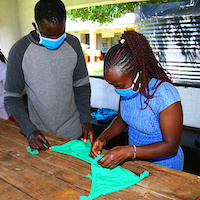Learning, demonstrating and helping: welcome to the Girls for Girls seminar!
As regular readers will know, international facilitators were working with Friends of Londiani Kenya to deliver G4G training courses last week. G4G, of course, is Girls for Girls, a programme that recognizes a simple fact: ensuring that girls in rural, remote or poorly served areas can afford and have access to sanitary products is a boost to their chances of attending, and remaining at school. By extension, of course, it's also a boost to their future chances in the job market or of gaining skills that could be useful to them in adulthood. It sounds simple. However, as we've already noted, a programme like this has numerous implications in hygiene, health education, infrastructure development and economic empowerment, some of which can be addressed in training courses. That’s why last week from the 19th to the 21st of March, Friends of Londiani held a three-day seminar bringing together educators from an amazing 18 schools across two sub counties in the Londiani area. Both secondary and primary school teachers were represented. The main objective of the seminar was to enable all girls to remain in school through sustainable means — in this case access to reusable sanitary towels and hygienic sanitation facilities. It wasn't just educators attending. The organisers were delighted to welcome representatives from the Kenya Gender Office, the Ministry District Education Office and Kisumu Medical Education Trust (KMET). KMET is of special interest from a practical point of view as it manufactures its own reusable sanitary towels — a useful example of some of the aims of G4G in action. Also attending was the Nairobi branch of the NGO Practical Action, which, like KMET, is working in partnership with Friends of Londiani. Practical Action, as the name implies, has aims very much in keeping with the G4G philosophy. Through technology Practical Action enables poor communities to build on their skills and knowledge to produce sustainable and practical solutions. The facilitators included not just Friends of Londiani staff but representatives of Girls for Girls USA. So between teachers, facilitators, and other parties contributing to the seminar or supporting its aims, the G4G seminar welcomed about 45 participants. In particular it welcomed practical demonstrations of some of the concepts behind G4G. For example, a women’s group from Londiani explained some of the income-generating activities they have carried out. The KMET team also showed the participants how they make their own reusable sanitary towels. They too explained some of the income-generating activities that they have undertaken. These are relevant because generating money will allow girls and women to finance their own sanitary needs. Of course G4G is also about encouraging more open discussion and understanding of the need for and importance of sanitary products and this too was a focus of the seminar — as we’ll find out in our next blog.

